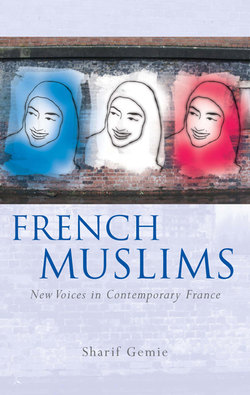Читать книгу French Muslims - Sharif Gemie - Страница 13
На сайте Литреса книга снята с продажи.
ОглавлениеChapter Two
Chahdortt Djavann: Assimilation as Liberation
__________________
I learnt my first words of French at the age of 25 … Today, I’m a writer: it’s possible in France to pull yourself up, even if you haven’t got a penny, even if you can’t speak a word. So, I reject this sob-story language, and let’s stop saying ‘we live in difficult areas, we’re poor …’ [interruption from Houria Bouteldja] … Here, in France, I have not known racism.
Chahdortt Djavann, 20061
Chahdortt Djavann and Houria Bouteldja were both guests on the ninety-minute-long television discussion programme Culture et Dépendances in January 2006. It was a strange occasion, with an odd selection of seven guests: among them, Vertan Berberian, a naturalized Armenian who proved to be more French than the French, Xavier Darcos, a sharp-suited and clean-shaven defender of the schools of Jules Ferry and a member of the government, the elephantine figure of Alain Finkielkraut, who seemed willing to talk for ninety-one minutes of the ninety-minute programme, and then the two women. Curiously, one could at least begin to describe them in similar terms. Both have mixed nationalities: Djavann is French-Iranian, Bouteldja French-Algerian. Both of them were brought up as Muslims, and both have raised questions about this faith. Both, in a sense, are rebels against established authorities: Djavann has been brave and forthright in her criticisms of the oppression of women by the Iranian Islamic Republic, while Bouteldja has criticized the racism of the French Republic. However, from the beginning of the programme, the differences between the two were obvious. It was even clear in their style of dress: Djavann had short, well-styled hair and wore an elegant, deep-red dress, an attractive example of that spontaneous, careless stylishness which French women spend hours achieving. Bouteldja dressed less fashionably, but was more willing to throw herself into debate. Djavann speaks with a slight but noticeable accent: she has no trouble expressing herself in French, but as the exchanges grew more heated it was noticeable that Bouteldja spoke louder and faster, while Djavann sounded angry, but more and more awkward, at one point even mistakenly addressing Bouteldja as ‘Monsieur’. At crucial moments, Finkielkraut seemed to be speaking in her place. The exchanges between the two women were not simply bad tempered, not just one more example of the professionalized rhetorical exchanges into which French public figures regularly enter, but something deeper. The obvious, extreme tension generated by their disagreements represented an absolute clash of ideas, ideals and experiences with no possibility of compromise.
Why consider Chahdortt Djavann in a book on French Muslims? It could well be argued that she is neither French nor a Muslim. She is, however, a naturalized French citizen, and her frequent, prominent presence in the French media comes from her claim to speak about the Muslim condition. There can be no doubt that her books have played a significant role in structuring the dominant French attitudes to Muslims. For these reasons, she merits inclusion.
Djavann’s France
